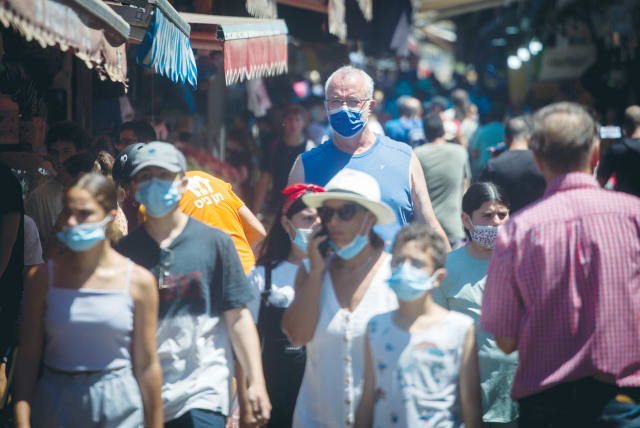Face masks had little effect in preventing COVID-19 infection, British study claims

During the middle of the COVID-19 pandemic, Israelis were fined by government authorities for not wearing face masks in public places, and violent incidents ensued when people refused to don them.
A new meta-analysis of 12 studies by the UK’s Cochrane Database of Systematic Reviews – which assesses the effectiveness and safety of a treatment, vaccine, device, preventative measure, procedure or policy – found that face masks worn in the community “probably made little or no difference to the outcome of influenza-like illness or COVID-19-like illness compared to not wearing masks.”
The high risk of “bias in the trials, variation in outcome measurement and relatively low adherence with the interventions during the studies hampers drawing firm conclusions,” Cochrane found. “There were additional randomized controlled trials during the pandemic related to physical interventions, but a relative paucity given the importance of the question of masking and its relative effectiveness and the concomitant measures of mask adherence which would be highly relevant to the measurement of effectiveness, especially in the elderly and in young children.”
According to Prof. Hagai Levine, chairman of the Israel Association of Public Health Physicians, the “Cochrane meta-analysis was not very persuasive. It is serious and good when looking at randomized controlled trials, but not necessarily in the community.”
Cochrane is important, “but it does not focus on public health,” he told The Jerusalem Post on Thursday. “The main thing is community intervention. Cochrane is good on some things, but it doesn’t provide all the right answers.
“The efficacy of face masks is only partial. More evidence is needed. There are crowded places where they were worn. When most people wore masks, the number of influenza cases dropped almost to zero, and when they stopped wearing them, the number bounced back. But I said at the height of the pandemic, and I say now, that forcing people to wear masks is not effective. Instead, the authorities must educate and persuade the people to do what they can to protect themselves.
Negative consequence of COVID-19 masks
“There wasn’t really a need to wear masks outdoors. And there was psychological damage to children, patients and others from others wearing face masks. Made of plastic materials, the hundreds of millions of masks caused environmental damage,” Levine said.
The Cochrane meta-analysis also looked at physical interventions, such as handwashing, to interrupt or reduce the spread of respiratory viruses.
“Nineteen trials compared hand hygiene interventions with controls with sufficient data to include in meta‐analyses,” Cochrane found. “Settings included schools, childcare centers and homes. Comparing hand hygiene interventions with controls (with no intervention), there was a 14% relative reduction in the number of infected people in the hand hygiene group, suggesting a probable benefit, according to the studies. In absolute terms, this benefit would result in a reduction from 380 events per 1,000 people to just 327 per 1,000 people.”
Jerusalem Post Store
`; document.getElementById("linkPremium").innerHTML = cont; var divWithLink = document.getElementById("premium-link"); if (divWithLink !== null && divWithLink !== 'undefined') { divWithLink.style.border = "solid 1px #cb0f3e"; divWithLink.style.textAlign = "center"; divWithLink.style.marginBottom = "15px"; divWithLink.style.marginTop = "15px"; divWithLink.style.width = "100%"; divWithLink.style.backgroundColor = "#122952"; divWithLink.style.color = "#ffffff"; divWithLink.style.lineHeight = "1.5"; } } (function (v, i) { });

